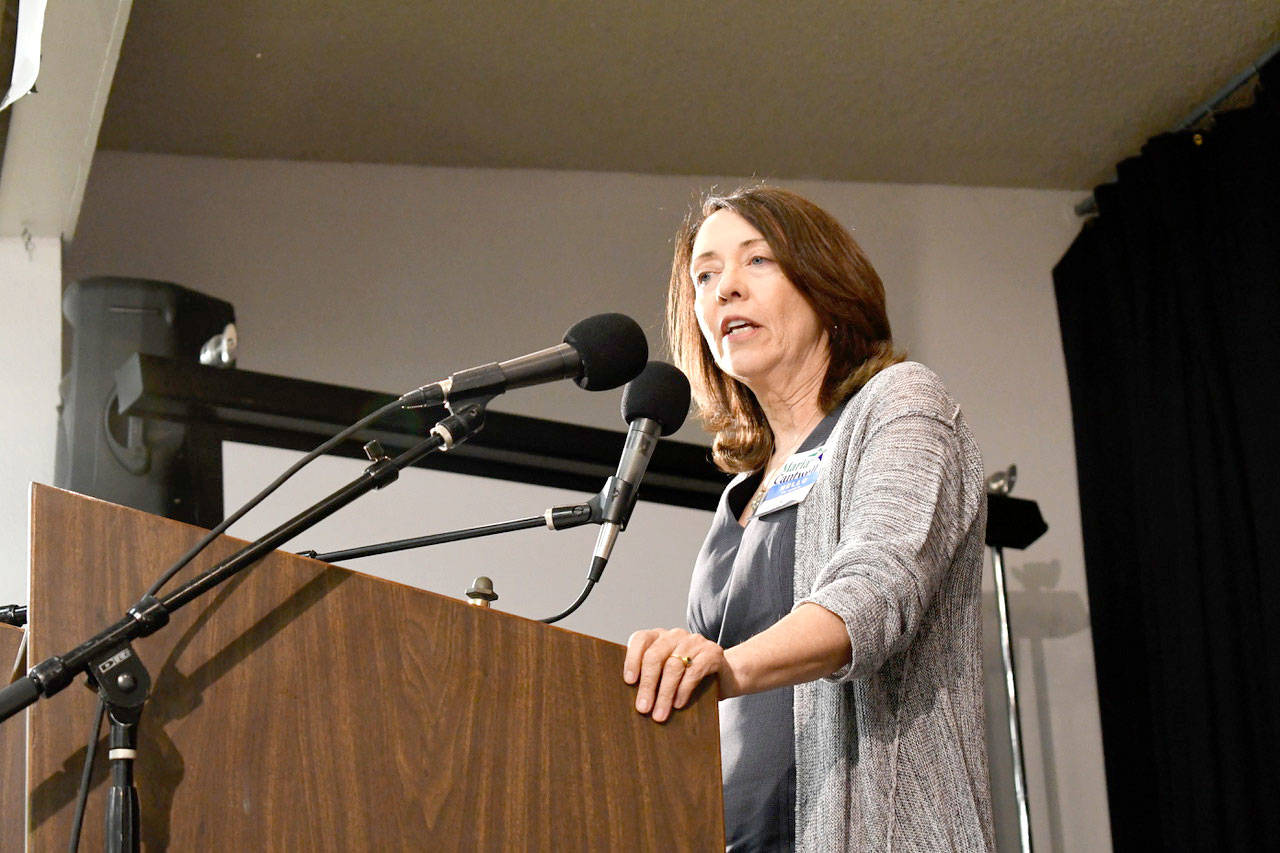PORT TOWNSEND — The environment took center stage as U.S. Sen. Maria Cantwell and state Commissioner of Public Lands Hilary Franz discussed ocean health, orcas and the wildfires burning across the state at the Jefferson County Democrats’ Fish Feast.
Franz was the keynote speaker at the Sunday evening fundraiser at the Jefferson County Fairgrounds, with 300 members of the party attending.
In describing the wildfires that are blanketing the area in smoke, Franz said no part of the state is currently smoke free.
“We are fighting fires more strategically and effectively with 96 percent of the fires staying under 10 acres. We’re using a new strategy: leveraging air assets on initial attack. The moment we see smoke, we are bringing in helicopters and a fire boss to keep the fires small. However, if we have more than 10-15 fires on our landscape, we will be unable to stop them.
“The latest predictions are that fire season will go through October this year,” Franz said.
The conversation moved from fire to water, and Cantwell, D-Mountlake Terrace, explained her plans to clean up local waterways.
The endangered southern resident orca population has been of national interest in recent weeks with the spotlight on a grieving orca mother holding on to her dead calf for two weeks, and the ailing J50 orca, the youngest member of the southern resident J pod, who seems to be emaciated and suffering from a parasitic infection.
“Orcas are sentinel, they are an indicator species, so we need to take the information seriously about the lack of salmon,” Cantwell said.
“Unfortunately, the president keeps trying to cut the program for salmon and salmon habitat. We are constantly fighting him and we haven’t been as successful as we’d like getting money to focus on farmed salmon. We could be doing so much better if we had cooperation from the administration.”
Cantwell said there are three things that are affecting the orca population.
“Toxins, habitat and noise are the biggest factors. … We are working with NOAA. We want them to make some decisions about habitat and what needs to be done.”
Noting that the Salish Sea is shared with British Columbia, Cantwell said that officials are calling on British Columbia to reduce logging in certain areas.
“We need to keep our streams clean and pristine, and clearly we want the Canadian government to participate. The ecosystem for salmon is everywhere; everyone thinks this is someone else’s issue. We all need to be good stewards.”
Cantwell said she is looking at cleaning up waterways through the use of improved technology.
“We have a bill that’s a shift,” she explained. “We are introducing an electric motor tax incentive for boats.
“We want to cut down on marine water pollution. We think there are some really good products on the precipice that can be adopted quickly.
“Ocean acidification is real, and when we help our shellfish industry with science and information, we can move forward. We need to make sure we are cleaning up the Salish Sea and giving it every chance we can possibly give it.”
Franz, who manages 2.6 million acres of aquatic lands, was blunt.
“When it comes to our salmon and salmon habitat, the food source the orca depend on, we are not doing well,” Franz said.
“We’ve known it for over 25 years when we listed salmon as an endangered species in central Puget Sound and the Puget Sound waterway. We know what we need to do to restore our salmon runs and be able to ensure that when the orcas get to the Salish Sea, they have food to depend on.”
She cited one of the biggest challenges as maintaining shoreline habitat.
Franz said much of the land is rapidly converting to impervious surfaces that create toxic runoff from stormwater into waterways.
Franz has focused efforts on replacing culverts so salmon can get into tributaries to lay their eggs where they won’t be washed away.
She said she also wants to create a pilot program of restoring a few watersheds through incentives, innovative partnerships and financing to turn the tide and see if a focused effort will make the difference.
“We are on the precipice of either getting better or getting worse.”
________
Jefferson County Editor/Reporter Jeannie McMacken can be reached at 360-385-2335 or at jmcmacken@peninsuladailynews.com.

